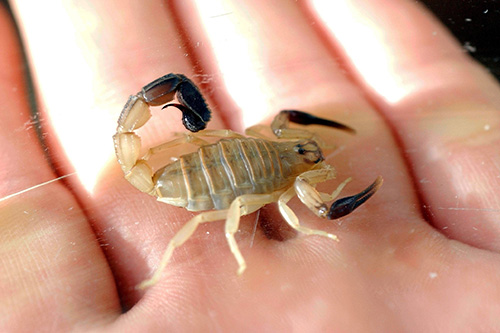Medical researchers at FAU identify scorpion venom as possible cancer treatment

Image: Colourbox.de
Researchers at Universitätsklinikum Erlangen at Friedrich-Alexander-Universität Erlangen-Nürnberg (FAU) have now examined a substance that is often used in traditional Chinese medicine – scorpion venom – and used it to treat particularly severe brain tumours, with surprising results.
In traditional Chinese medicine, extracts from the venom of the Chinese golden scorpion (Mesobuthus martensii) are considered particularly effective against neurological disorders such as chronic pain, paralysis, strokes and epilepsy.
In collaboration with Chinese microbiologists, medical researchers at FAU have identified two new active agents extracted from this venom that can stop so-called gliomas, brain tumours that are currently very difficult to treat.
The team led by neuroscientist PD Dr. Nicolai Savaskan were able to show that the two substances, known as CA4 and CTX-23, prevent the rapid division of tumour cells and stop the formation of tumour blood vessels.
'The two scorpion venom derivatives that we have found are a good example of how traditional Chinese medicine can enrich western medicine – and are promising treatments for our patients.'
The researchers have recently published their findings in the journal Scientific Reports.
Further information for patients:
Phone: +49 9131 8549000
krebsinformation@uk-erlangen.de
Information for the press:
PD Dr. Nicolai Savaskan
Phone: +49 9131 8534626
nicolai.savaskan@uk-erlangen.de
Media Contact
More Information:
http://www.fau.de/All latest news from the category: Life Sciences and Chemistry
Articles and reports from the Life Sciences and chemistry area deal with applied and basic research into modern biology, chemistry and human medicine.
Valuable information can be found on a range of life sciences fields including bacteriology, biochemistry, bionics, bioinformatics, biophysics, biotechnology, genetics, geobotany, human biology, marine biology, microbiology, molecular biology, cellular biology, zoology, bioinorganic chemistry, microchemistry and environmental chemistry.
Newest articles

Security vulnerability in browser interface
… allows computer access via graphics card. Researchers at Graz University of Technology were successful with three different side-channel attacks on graphics cards via the WebGPU browser interface. The attacks…

A closer look at mechanochemistry
Ferdi Schüth and his team at the Max Planck Institut für Kohlenforschung in Mülheim/Germany have been studying the phenomena of mechanochemistry for several years. But what actually happens at the…

Severe Vulnerabilities Discovered in Software to Protect Internet Routing
A research team from the National Research Center for Applied Cybersecurity ATHENE led by Prof. Dr. Haya Schulmann has uncovered 18 vulnerabilities in crucial software components of Resource Public Key…





















